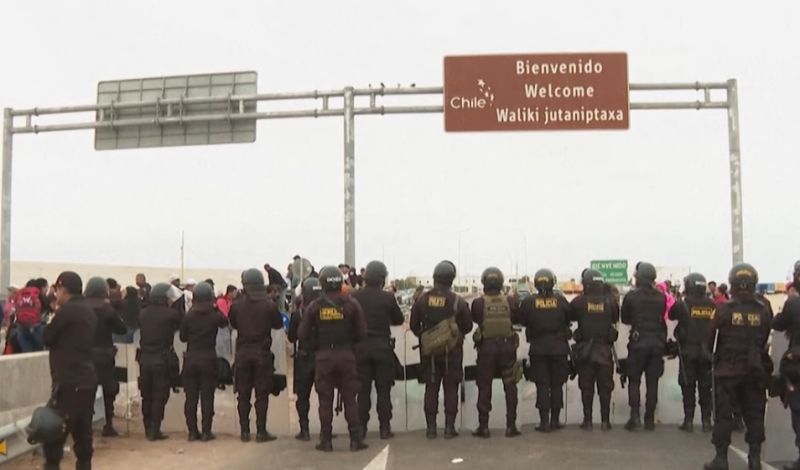
ACI Prensa Staff, May 1, 2023 / 15:00 pm (CNA).
The bishops of the dioceses of Tacna, Peru, and Arica, Chile, have called on the authorities of both countries to seek a solution through dialogue to the migration crisis that is currently taking place at the border.
For the last two weeks, hundreds of migrants — mostly Venezuelans but also Colombians and Haitians — have been trying to leave Chile and enter Peru because Chile has toughened its immigration policies. The foreigners state that their ultimate goal is to return to their countries of origin.
However, according to the minister of the interior of Peru, Vicente Romero, only those who present their immigration card, visa, and passport are being accepted. The rest have remained on the border between the two countries, enduring the inclement weather of the desert, with some of them engaging in confrontations with the police.
Given the situation, the Peruvian government declared a state of emergency last week at most of its border crossings in order for the armed forces to support the police. For its part, the Chilean government ordered the militarization of its northern border in February to prevent more migrants from illegally entering the country.
In a statement issued April 29, the bishop of Tacna and Moquegua, Marco Cortez, and the bishop of Arica, Moisés Atisha, lamented the clashes at the border and reiterated their call that with “sincere dialogue between all parties involved,” a solution could be found for migrants, including families with children and older people.
The prelates pointed out that “we all agree that the migratory phenomenon must be regulated by the pertinent authorities,” but this “is not synonymous with banning or considering such people as an evil for society.”
The bishops said that the militarization of the border or declaring an emergency “are coercive measures that demand more considered and fair solutions.”
However, they added that the acts of violence committed by some migrants in the countries that have received them has led to citizens being against those seeking better living conditions.
Those who are trying to cross the borders “are people looking for a place where they have opportunities to build a decent life,” the bishops said, pointing out that extreme poverty has forced them to emigrate.
“For this reason, we recognize and appreciate the efforts and services that are being carried out by the constituted authorities and civil society institutions. As the Catholic Church, we are not only present in times of emergency, but we walk with them every day and seek to welcome them and integrate them into society,” they added.
The bishops of Tacna and Arica noted that the solution depends on political decisions and therefore requested “an authentic and sincere exercise of co-responsibility on the part of the international community” and of the national and regional authorities.
Finally, the prelates invoked the protection of the Virgin of Coromoto, patroness of Venezuela, and urged the authorities to seek God’s help to find “the ways to solve this problem so that we do not have to mourn victims due to violence that is breaking out.”
“The solution to any social problem will only be possible if the dignity of each person is recognized and respected, since this is an inalienable value that cannot be in play when solving problems,” they stated.
This story was first published by ACI Prensa, CNA’s Spanish-language news partner. It has been translated and adapted by CNA.
If you value the news and views Catholic World Report provides, please consider donating to support our efforts. Your contribution will help us continue to make CWR available to all readers worldwide for free, without a subscription. Thank you for your generosity!
Click here for more information on donating to CWR. Click here to sign up for our newsletter.




This is what I cannot understand. Pope Francis has been screaming about his ‘Open Borders’ at Vatican City State for years. Why not load up some C-130 troop carriers and safely transport all those in need to Vatican City State?